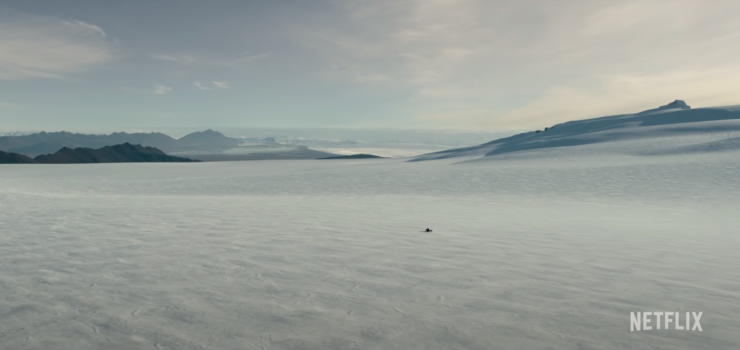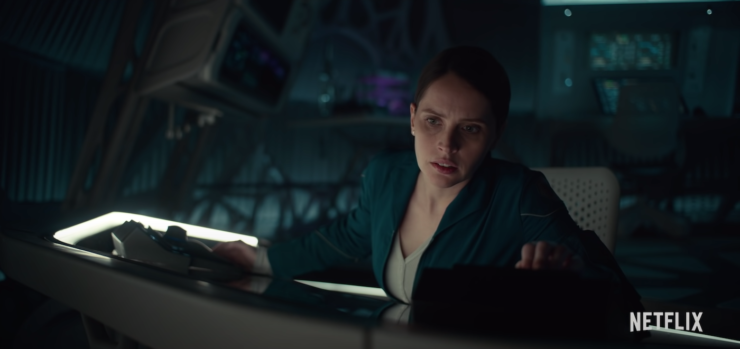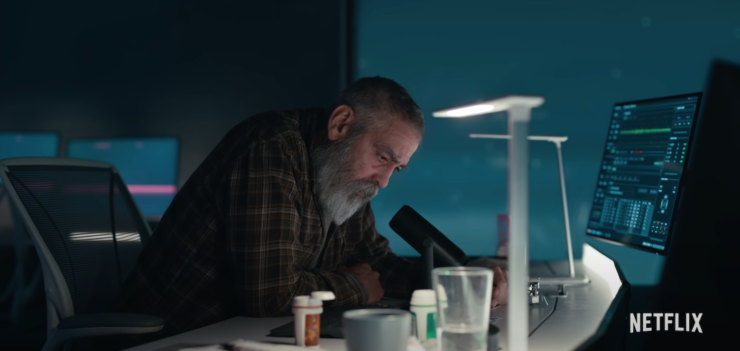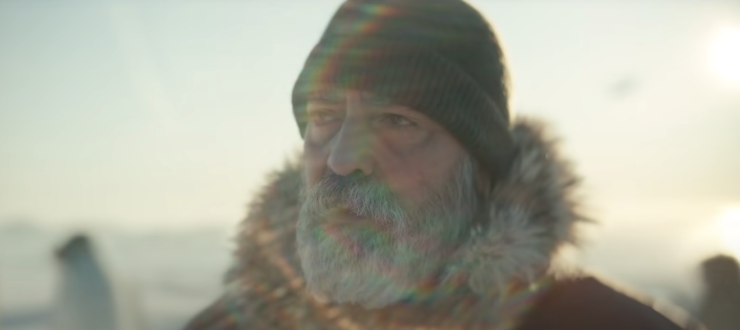Space movies are usually about hope. Usually, if a character heads off into the harsh vacuum of space, it’s because they’re exploring, or learning, making contact with aliens, or transforming into StarBabies, or trying to create a far-flung future for humanity. Because of that, I find it fascinating that The Midnight Sky, an adaptation of Lily Brooks-Dalton’s novel, Good Morning, Midnight, becomes a rare example of a bleak space movie. It’s an interesting, and often moving, addition to the space movie canon that never quite figures out what it wants to be.
The book is a quiet meditation on family, loneliness, and the sort of choices that people make without fully realizing that they’re defining their lives. It has a couple of plot twists that I thought worked pretty well, because Brooks-Dalton was able to build states of mind, sudden reveals, and emotional epiphanies in ways that novels are uniquely equipped to do. I was intrigued to see how the movie would handle them, and I was surprised at how well they worked. Unfortunately, the film has a few other problems and plot holes that make this an uneven experience.
While keeping the main structure of the book, the film tries to make the story a bit more of a tense race against time, while keeping as much of the meditation on loneliness as possible. It ends up feeling like something of a mishmash of other astronaut films. There’s the sense of lost time and climate catastrophe that marked Interstellar, a tense spacewalk a la Gravity, the mournful quiet of Moon, and the lone human against an implacable wilderness of The Martian. Since it tries to do a few different things, however, I never felt like the threads quite locked together the way I hoped they would. There are also some logistical things that pushed me out of the movie that I talk about in a spoiler section below, but only go there if you’ve seen the film! (I give the whole thing away down there, seriously.)
Dr. Augustine Lofthouse is terminally ill—this is revealed in the second line of dialogue—and decides to stay behind at an Arctic research station when his colleagues evacuate due to a possibly extinction level climate event—that’s about the fourth line of dialogue. He doesn’t have long to live, and he’d rather stay behind to keep working up to the end, basically.
The people he’s trying to connect with are the crew of The Aether. Commander Gordon Adewole, Mission Specialist Sullivan, Maya, Sanchez, and Mitchell were sent into space to research K23, a planet that was theorized might sustain human life some thirty years earlier. They’re on their way back to Earth with samples and research, happy to report that K23 is a great choice for a colony. In fact, there was supposed to be a colony ship ready to go? And a lot more contact with Earth in general? But no one’s answering their comms, and they’re starting to worry.
The film spins from there, with Dr. Lofthouse racing to get a warning to The Aether, and the crew trying to navigate home with dwindling hope.
As might be evident by now, while Sol appears in many shots, this is not a sunny film.

Many of the scenes of life in the space station are great, as is a trek across the Arctic tundra. All the sections aboard The Aether are solid space movie stuff, especially the tense spacewalk I mentioned earlier. Unfortunately, I don’t think the two sections work as mirrors for each other as well as they do in the book. Instead it’s often jarring when we jump from Dr. Lofthouse trudging through snow out to Sully excitedly hauling herself into one of The Aether’s zero G hallways so she can float rather than waddle. The other clunkiness comes when the film whisks us back to Dr. Lofthouse’s past, so we can get a sense of how he came to be this eminent scientist working in the Arctic. The tension between The Work! and A Personal Life! are a little overdone, which undercuts the genuine pathos of his current situation.
George Clooney is great as usual, but in a slightly different way than usual. The scenes of him alone, shuffling through the station and trying to get a message out to the last of Earth’s space shuttles, would be affecting even in a regular year. (This year, I confess, I had to pause the movie a couple times.) I don’t know if I’ve ever seen Clooney this …desolate? But he captures Lofthouse’s deep sadness and determination extremely well. Newcomer Caoilinn Springall is luminous as a little girl in the station, Tiffany Boone is vibrant as Maya, and Felicity Jones and David Oyelowo imbue Sully and Adewole with the exact mix of stoicism and deadpan humor you want in an astronaut. Demián Bichir and Kyle Chandler are also solid as Sanchez and Mitchell, but they’re not given as much to do, and since we don’t spend much time learning about their lives it’s harder to invest in them.
Now having said all of that—there are a few points where the film stretches credulity. Just as Mark Watney’s ability to survive on Mars got a little unbelievable a few times, here Dr. Lofthouse’s trek across the Arctic goes in some directions that work well in an action movie, but are a little harder to buy in this context. There’s also my usual problem with these stories—this film is set in 2049. For all that this year seems to have stretched into ten years, it is still only just turning 2021 in a week. That means that the main action of this film is nearly thirty years in the future. Dr. Lofthouse, Mitchell, and Sanchez are all just getting rolling in their careers. Sully and Adewole are both still children. Maya hasn’t started elementary school yet. AND YET. The one pop culture reference I noticed was a (sweet, funny) bit about a song that is right now currently fifty-one years old. And yes, Maya explicitly says she doesn’t know the song, but everyone else knows every lyric! Meanwhile, songs that are popular right now, the ones that would have soundtracked most of these characters youths, never pop up. No “Old Town Road”, no “Good as Hell”, no “Watermelon Sugar”—this always bugs me in near-future stories. Map out your characters’ lives! Are they 30-ish twenty years from now? Then what did their moms have on the Spotify list when they were ten? Cause that’s what they imprinted on.
But the main thing that doesn’t quite work for me in the movie lies in the spoiler section, so only head there if you’ve seen the movie.

SPOILERS AHOY!
The Good!
OK, about the twist. I think the movie does pretty well with how they reveal Iris, and how she appears and disappears throughout the film. It’s just interesting to me that despite the fact that the film includes a moment hinting that a kid might have been left in the station, seeing her in the film is much less believable than reading her was in Brooks-Dalton’s novel. She’s much more obviously a construct of his mind in the film, which I think works extremely well. Ditto the reveal at the end of the film! I think Clooney and Jones turn their final dialogue into something truly beautiful.
The Bad!
Anyone who has ever seen a space movie knows that Maya is doomed as soon as she says it’s her first spacewalk. It’s the “I have three days until retirement!” of space movies. The execution of her doom is wonderfully done. I actually thought the movie had let her off the hook for a few minutes until her injuries revealed themselves.
Her death solves one problem, but creates a new one.
You see, the whole point here, the driving tension of the film (which is different than that of the book) is this idea that if Dr. Lofthouse can get in touch with The Aether, he can warn them, and they can slingshot back to the safety of the K23 Colony. Except.
This crew is made up of three men: Mitchell, who is married to a woman and has a family back home, Sanchez, who is revealed to have a daughter but whose romantic status is never revealed, and Adewole, who is the father of Sully’s baby, though their current state of partnership is left a little ambiguous. Then there are two women: Sully and Maya. Sully is pregnant, Maya is young enough to be the other men’s daughter, and her own inclinations are never discussed. So if Maya had lived, and all of them had headed back to K23, you end up in a scenario where there are two somewhat older men, both of them grieving their dead families, a couple with a baby, and a younger woman with no potential partners, living out their lives together with whatever supplies were sent by Earth before The Event.
Not fun.
Instead, Maya dies, and then Mitchell and Sanchez decide to return to Earth and certain (possibly immediate) death. Mitchell because he “wants to go back to his family” and Sanchez because he wants to bring Maya’s body back to home. Which is noble, and beautiful on a certain level. But it also means that rather than going back to K23 to live out the rest of their lives as a makeshift family with Adewole, Sully, and their child, the other men are dooming the couple to return alone, deal with Sully’s delivery alone, raise the child alone, and, if they live long enough, eventually be cared for by a child who will then watch both of its parents die, live out the rest of its life on K23, alone, and then die, alone.
At least with two more able-bodied men life in the colony would have been a little easier. At least for a while.
Now it could be that I’ve been in isolation too long, or that I’ve seen too many space movies, or that I’m thinking too hard rather than allowing the movie to wash over me. But I got the sense that the filmmakers wanted me to feel a sort of swell of emotion or grief or something when Mitchell and Sanchez make their decision, and instead I ran through all of these scenarios and just got mad at these two fictional men.

END OF SPOILERS!
Now for those who didn’t read the spoilers—is The Midnight Sky worth a watch? I’m honestly on the fence here. After everything, and even with all of my issues with the film, there are a few scenes at the end that were simply gorgeous, raw, emotional work from everyone involved, and I don’t want to diminish that. I think that if you liked all of the space canon I mentioned at the beginning of this review, you might get a lot out of The Midnight Sky. (I’m also still mulling whether people who like Ad Astra might enjoy this one? For the record, I hated Ad Astra.) I also found myself thinking about First Man quite a bit. That was also a slow, sad film, but I left that one wanting to talk about it and watch it again. And while there are lovely moments in this film, The Midnight Sky is desolate in a way that, for me at least, won’t invite repeat viewing.
Leah Schnelbach still doesn’t want to go into space…but this movie did make it look pretty as heck. Come talk about pop culture of the future on Twitter!










